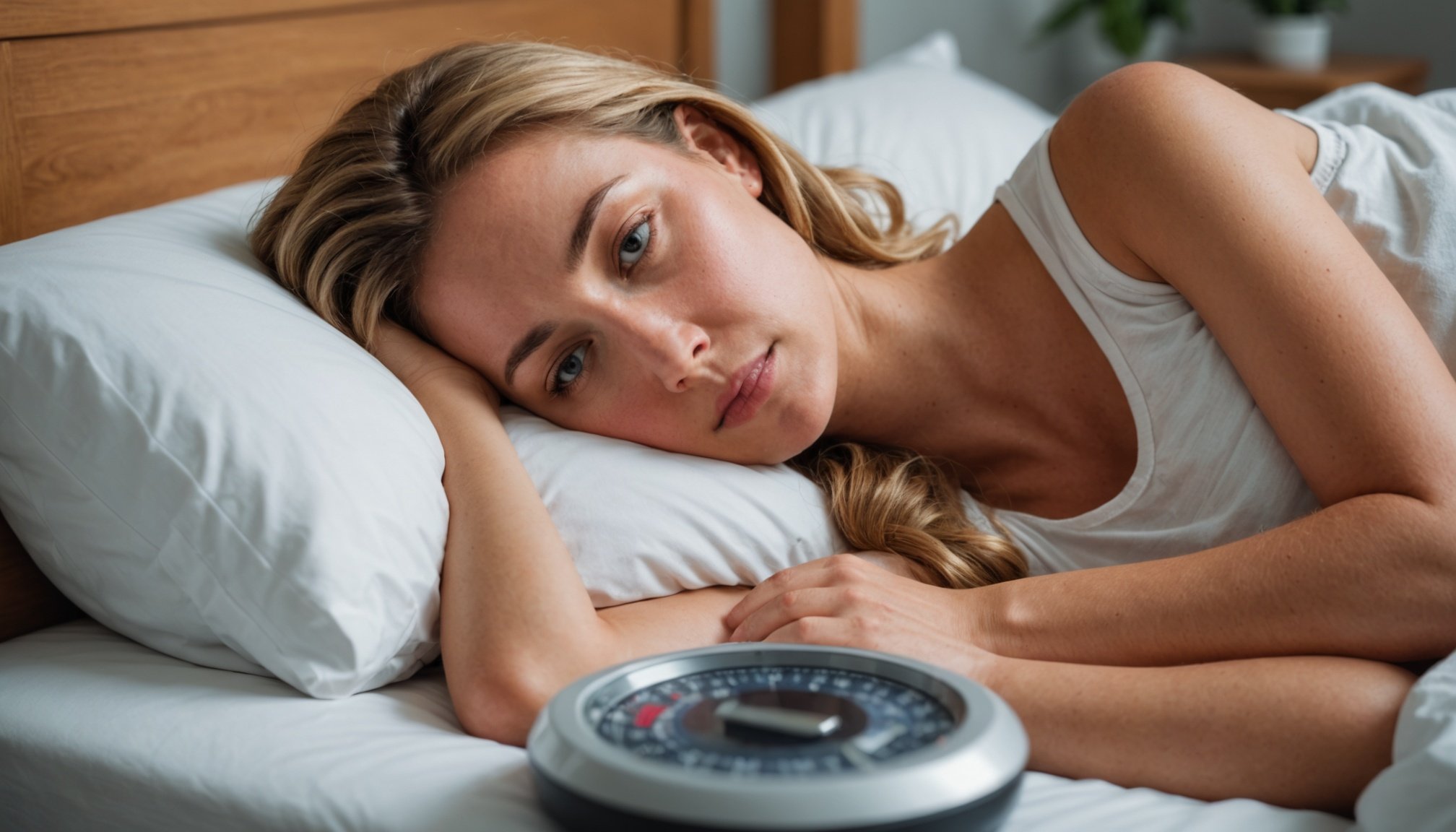Unlocking the Link: How Sleep Quality Influences Weight Control in the UK
The Importance of Sleep for Health and Wellbeing
When we think about maintaining a healthy weight, the first things that come to mind are usually diet and exercise. However, there is another crucial factor that often gets overlooked: sleep. Sleep is not just a passive state where our body rests; it is an active process that plays a vital role in our overall health and wellbeing, including our ability to control weight.
Research by sleep experts, such as Professor Matthew Walker, has highlighted the significance of sleep in various physiological processes. Walker’s work, as detailed in his book “Why We Sleep: The New Science of Sleep and Dreams,” shows that sleep affects everything from our metabolic rate to our mental health.
Also read : Exploring the Health Risks of Extended Sitting Among Teen Gamers in the UK: A Comprehensive Guide
How Sleep Affects Weight Control
The Science Behind Sleep and Weight
Sleep influences weight control through several mechanisms:
-
Metabolic Regulation: Sleep helps regulate hormones that control hunger and fullness. Leptin, which suppresses appetite, and ghrelin, which stimulates appetite, are both affected by sleep quality. When we don’t get enough sleep, the balance of these hormones can be disrupted, leading to increased hunger and food cravings.
In the same genre : Top Exercises to Enhance Posture for UK Office Workers Struggling with Back Pain
-
Insulin Sensitivity: Poor sleep quality can lead to reduced insulin sensitivity, making it harder for glucose to enter cells. This can result in higher blood sugar levels and an increased risk of developing type 2 diabetes, which is closely linked to weight gain.
-
Physical Activity: Lack of sleep can reduce motivation and energy levels, making it less likely that people will engage in physical activity. This decrease in physical activity can contribute to weight gain over time.
-
Gut Microbiome: Sleep also affects the gut microbiome, which is crucial for digestive health and nutrient absorption. A disrupted gut microbiome can lead to changes in metabolism and weight management.
Practical Impacts on Daily Life
Here are some practical ways in which poor sleep quality can impact weight control in daily life:
-
Increased Stress: Stress is a common consequence of poor sleep, and it can lead to overeating and poor food choices. When we are stressed, our brain often seeks comfort foods that are high in calories and low in nutrients.
-
Poor Food Choices: Lack of sleep can impair cognitive function, including decision-making skills. This can result in poorer food choices, such as opting for fast food or processed snacks instead of healthier options.
-
Reduced Willpower: Sleep deprivation can reduce willpower, making it harder to stick to a diet or exercise plan. This can lead to a cycle of weight gain and difficulty in losing weight.
The Impact of Daylight Saving Time on Sleep and Weight
Daylight Saving Time (DST) is another factor that can significantly affect sleep quality and, by extension, weight control. The twice-yearly clock changes disrupt circadian rhythms, which are essential for maintaining good sleep hygiene.
Disrupting Circadian Rhythms
-
Morning Light Exposure: The spring shift forward reduces morning light exposure, which is crucial for setting our body clocks. This can lead to difficulty waking up and feeling alert in the mornings, affecting daily routines and food choices.
-
Evening Light Exposure: The autumn shift back increases evening light exposure, which can delay sleep times. This can result in shorter nights and poorer sleep quality, further impacting weight control.
Recommendations from Sleep Experts
Experts from the British Sleep Society have advocated for the abolition of DST and the reinstatement of Standard Time year-round. They argue that this would better align the UK’s clocks with natural daylight patterns, reducing disruptions to sleep and circadian health.
Strategies to Improve Sleep Quality for Better Weight Control
Improving sleep quality is a multifaceted approach that involves several lifestyle changes and habits. Here are some strategies to help you sleep better and, in turn, improve your weight control:
Establishing Good Sleep Hygiene
- Consistent Sleep Schedule: Go to bed and wake up at the same time every day, including weekends. This helps regulate your body’s internal clock.
- Sleep-Conducive Environment: Ensure your bedroom is dark, quiet, and cool. Invest in a comfortable mattress and pillows.
- Avoid Stimulating Activities Before Bed: Avoid screens, intense workouts, and stimulating activities at least an hour before bedtime.
- Relaxation Techniques: Practice relaxation techniques such as deep breathing, meditation, or reading to help you wind down before bed.
Managing Stress and Mental Health
- Stress Reduction: Engage in stress-reducing activities like yoga, walking, or journaling.
- Seek Professional Help: If you are struggling with mental health issues, seek help from a mental health professional.
Improving Sleep Through Diet
- Avoid Heavy Meals Before Bed: Eating a large meal close to bedtime can disrupt sleep. Opt for a light dinner and avoid heavy snacks.
- Stay Hydrated: Drink water throughout the day, but avoid excessive fluid intake close to bedtime to minimize nighttime awakenings.
Table: Comparing the Effects of Permanent DST and Standard Time on Sleep and Weight
| Aspect | Permanent DST | Permanent Standard Time |
|---|---|---|
| Morning Light Exposure | Reduced, especially in winter | Better aligned with natural daylight |
| Evening Light Exposure | Increased, potentially delaying sleep | More balanced, allowing for earlier sleep times |
| Circadian Rhythms | Disrupted, leading to sleep problems | Better aligned, reducing sleep disruptions |
| Weight Control | Potentially worse due to poor sleep quality | Better due to improved sleep quality and circadian alignment |
| Geographical Impact | Northern and western UK would experience later sunrises | More consistent sunlight exposure across the UK |
| Health Impacts | Increased risk of sleep deprivation, metabolic issues | Reduced risk of sleep deprivation, improved overall health |
Quotes from Experts
-
“Sleep is not an optional lifestyle luxury. Sleep is a non-negotiable biological necessity. It is your life-support system, and it is mother Nature’s best effort yet at immortality.” – Professor Matthew Walker.
-
“The British Sleep Society strongly recommends that the UK adopts permanent Standard Time to align our clocks with natural daylight patterns, thereby reducing disruptions to sleep and circadian health.” – British Sleep Society position statement.
Sleep quality is a critical component of overall health and wellbeing, and it plays a significant role in weight control. By understanding the mechanisms through which sleep affects weight and implementing strategies to improve sleep hygiene, we can better manage our weight and improve our overall health.
In the UK, the debate around Daylight Saving Time highlights the importance of aligning our clocks with natural daylight patterns to minimize disruptions to sleep and circadian health. By adopting permanent Standard Time and focusing on good sleep practices, we can create a healthier environment that supports better sleep, mental health, and weight control.
Practical Advice for Better Sleep and Weight Control
Here are some final tips to help you improve your sleep quality and, in turn, your weight control:
- Monitor Your Sleep Patterns: Keep a sleep diary to track your sleep patterns and identify areas for improvement.
- Seek Help When Needed: If you are struggling with sleep problems, consult with a healthcare professional.
- Make Lifestyle Changes Gradually: Start with small changes to your sleep habits and gradually work towards a healthier sleep routine.
- Stay Consistent: Consistency is key when it comes to sleep. Stick to your routine even on weekends or during holidays.
By prioritizing sleep and making conscious efforts to improve its quality, you can take a significant step towards better health and wellbeing, including effective weight control.











